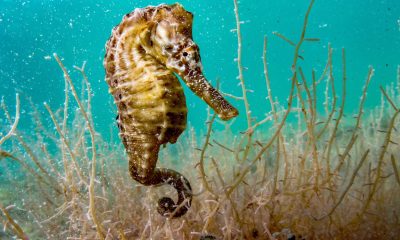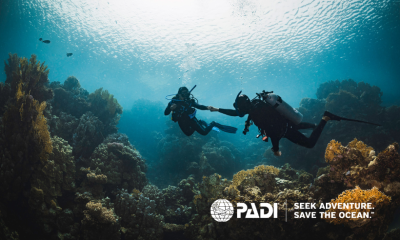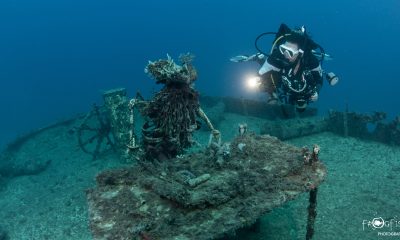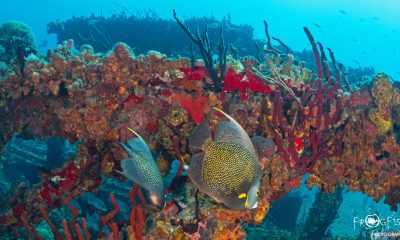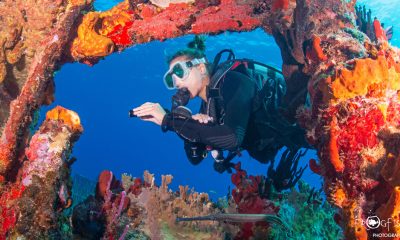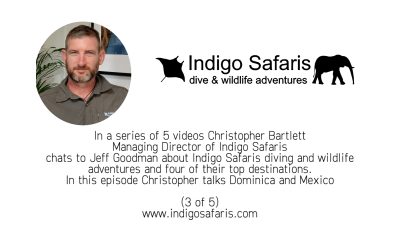News
Diving With… Andre Miller, Barbados Blue, Barbados, West Indies
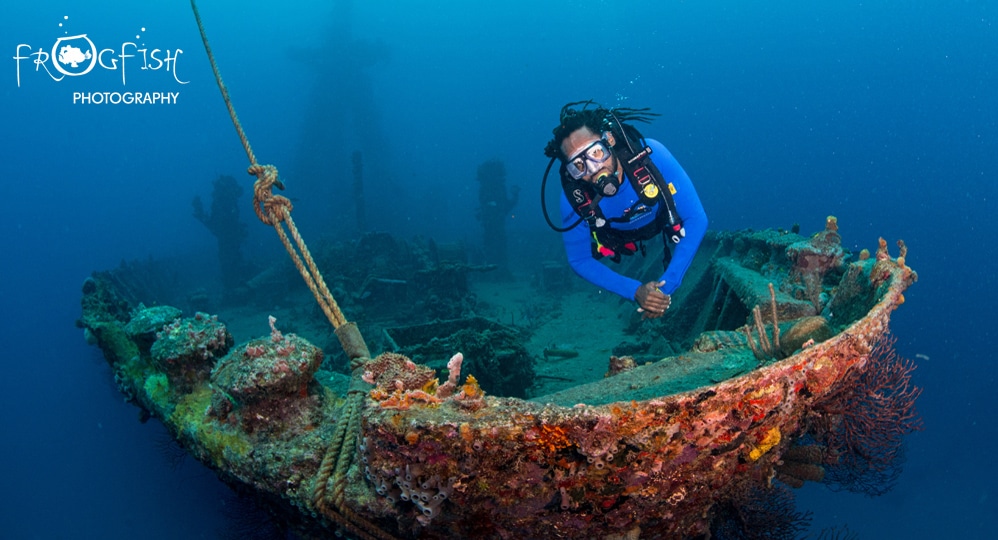
In this ongoing series, we speak to the people who run dive centres, resorts and liveaboards from around the world about their businesses and the diving they have to offer…
Andre Miller
What is the name of your business?
Barbados Blue
What is your role within the business?
Manager/Owner/Dive instructor
How long has the business operated for?
13 years
How long have you dived for, and what qualification are you?
More than 25 years; PADI Master Scuba Diver Training and Freediving Instructor
What is your favorite type of diving?
Education diving – when we are teaching about the health and importance of the reef and its creatures. Or when I am learning about my own inner ocean peace on a freedive.
If you could tell people one thing about your business (or maybe more!) to make them want to visit you what would it be?
We legitimately love what we do. Barbados Blue is run by marine biologists and built from a crew of ocean-loving, happy people. As small island people we grew up at the beach and it means more to us than just a job or just a pastime. Our hearts are in the ocean and we consider ourselves lucky – even on those extra days – to be able to share what we do with you.
Uniquely we also have a sister dive shop, Grenada Blue, better known as Eco Dive in Grenada so we can offer a two island holiday, or a repeat Caribbean destination built on the same values, education and principles.
What is your favorite dive in your location and why?
Carlisle Bay Marine Park – an amazing series of wrecks and patch reef right off the beach, two minutes from the dive centre. This dive never gets old, with history, wreck swim throughs, the new MV Trident, great marine life including a hot zone for seahorses, frogfish, rays, turltes and more. This is a gem of a training site, an amazing site for photographers and the perfect location for Freedivers, beginners to advanced. I really do LOVE my backyard Marine Park.
What types of diving are available in your location?
Wrecks – Stavronikita, Bajan Queen, Cornwallis, Berwyn, C-trek, Pamir, Brianna, Trident, Friar’s Craig
Reef Diving – all over patch reef and bank reefs around our coral island
Adventure Diving – East Coast and North coast in calm conditions
What do you find most rewarding about your current role?
The ability to share my passion, to teach, and to help the next generation set the stage for a better Barbados to come.
What is your favorite underwater creature?
Sea Turtles – we have tons of them! But if that is too obvious I am going for a ‘Thumb Splitter’ mantis shrimp. With some of the most amazing eyeballs, colourings and their sneaky powerhouse, I love their stealth and the challenge of finding one.
Are there any exciting changes / developments coming up in the near future?
Along with our sister shop Eco Dive in Grenada we are the only shops in the southern Caribbean offering the PADI Coral First Aid coral nursery specialty course. This is designed to give our juvenile corals at risk a fighting chance, a place to grow big and strong before being outplanted on the reef, while providing our skilled guests the chance to get involved and help make a real difference on the reef and in our marine parks. We need more marine parks and Barbados is just getting going. There are exciting chances in the works, stay tuned.
As a center what is the biggest problem you face at the moment?
- Over-fishing.
- Oxybenzone based sunscreens that prevent the corals from reproducing properly (please get your hands on reef safe – zinc – based sunscreens before arrival)
- Ocean plastics (help us reduce our plastic use by refusing single use bags, straws, cups and any unnecessary plastics.
Is your center involved in any environmental work?
Eco Dive (Grenada) got us signed up for Project AWARE’s 100% AWARE programme, with them as a sister dive shop challenge a number of years ago and we’ve never looked back. Between our sister centres we have donated over $12,000 US to ocean conservation efforts and are not done yet. Inspired by the progress we have opened our own non-profit NGO’s called Eco Blue that allow us to give back locally with learn to swim, mega fauna (shark and ray) marine education, permanent mooring, invasive species lionfish outreach and more. Within Barbados Blue itself, on top of the 100% AWARE, we are also running the Coral First Aid nursery specialty course, and we help the Barbados sea turtle project with turtle tagging and rescue.
How do you see the SCUBA / Freediving / snorkeling industry overall? What changes would you make?
Incorporate more conservation info as mandatory course info into training programmes. We would love to see an ECO Open Water that builds more conservation into the course from the first time you hit the pool. Many of our fellow centres are on board – but not all… and not all enable it to be easy or obvious. Our divers are our messengers. Divers that make a difference could be all divers (you did ask me to dream)… Remember the effect of a butterfly’s wings, all of our actions matter!
And we are LOVING the freediving. An amazing way to connect with the ocean on a different level, and a ‘greener’ way to dive.
What would you say to our visitors to promote the diving you have to offer?
Welcome! We are here to help, here to build a connection with our divers and here to share the ocean love in beautiful Barbados.
Where can our visitors find out more about your business?
Tel: 246-434-5764
Whatsapp: 246-230-3064
News
Seahorse National Park announced on Eleuthera in The Bahamas
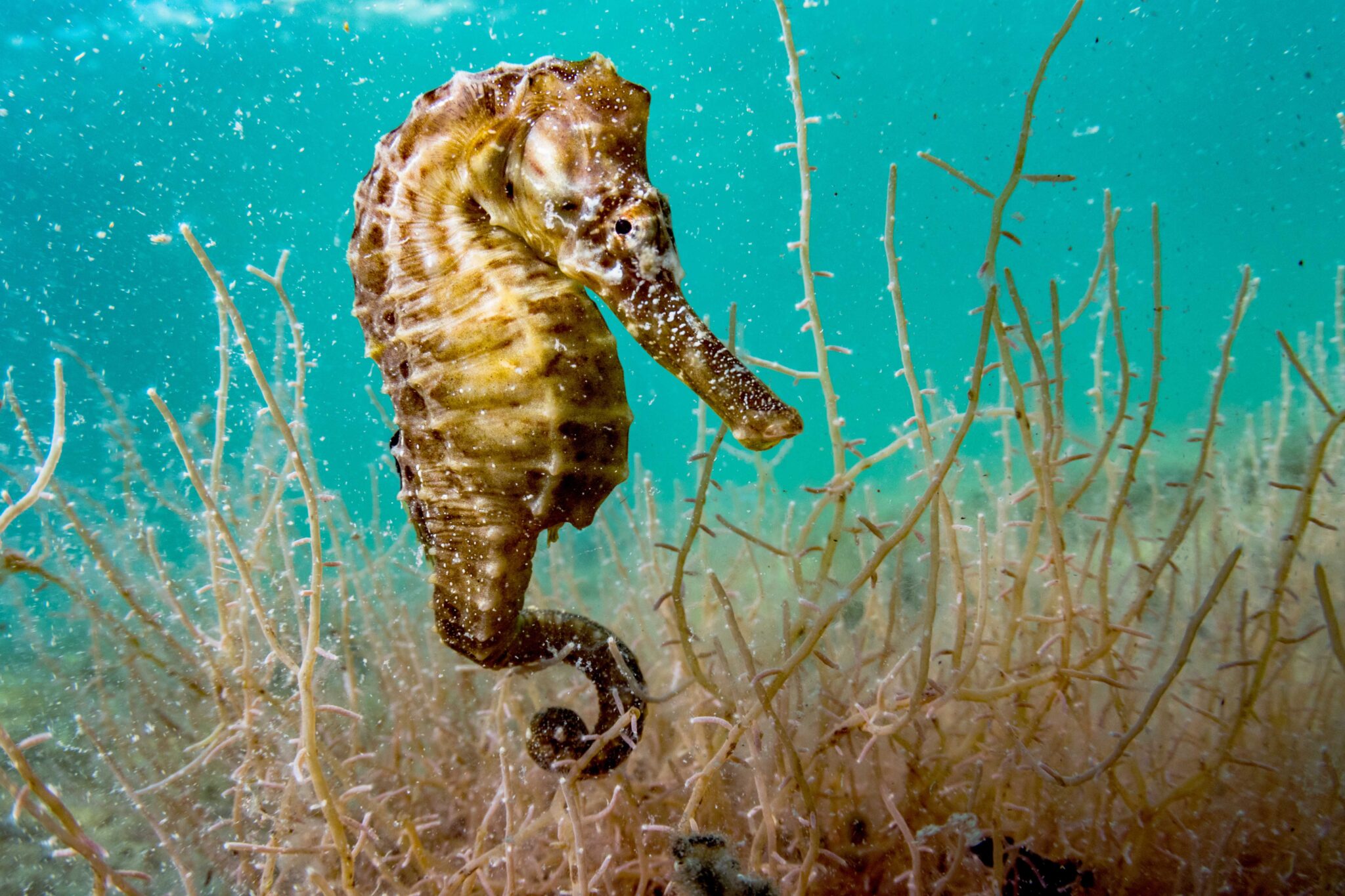
This week has seen the announcement of the designation of Seahorse National Park at Hatchet Bay Cave and Sweetings Pond on Eleuthera. This monumental announcement comes after years of efforts from the BNT and its partners in advocating for the protection of Sweetings Pond and its surrounding areas as an official national park under the BNT’s management.
Sweetings Pond is a large, land-locked saltwater pond in Hatchet Bay, Eleuthera. It has many unique natural features, but the most notable of them all is its incredible seahorse population, which is believed to be the densest population of seahorses in the world. The new 548-acre national park protects the entire one-mile-long pond and the surrounding terrestrial area. The land surrounding Sweetings Pond is a blend of intact coppice, mangroves, and farmlands. In addition, the new national park includes the extensive Hatchet Bay Caves system. This historic cave system is a popular attraction and contains a number of impressive geological features. It is one of the longest dry cave systems in The Bahamas.
Since 2014, the BNT has been leading efforts to have the area declared as a national park. This included years of public outreach and stakeholder consultations in communities across Eleuthera; education presentations in local schools; science and research efforts; and engaging consecutive government administrations. In 2018, the BNT submitted the “20 by 20 Marine Protection Plan” to the government, which included the recommendation to declare Sweetings Pond and other areas in The Bahamas as protected areas.
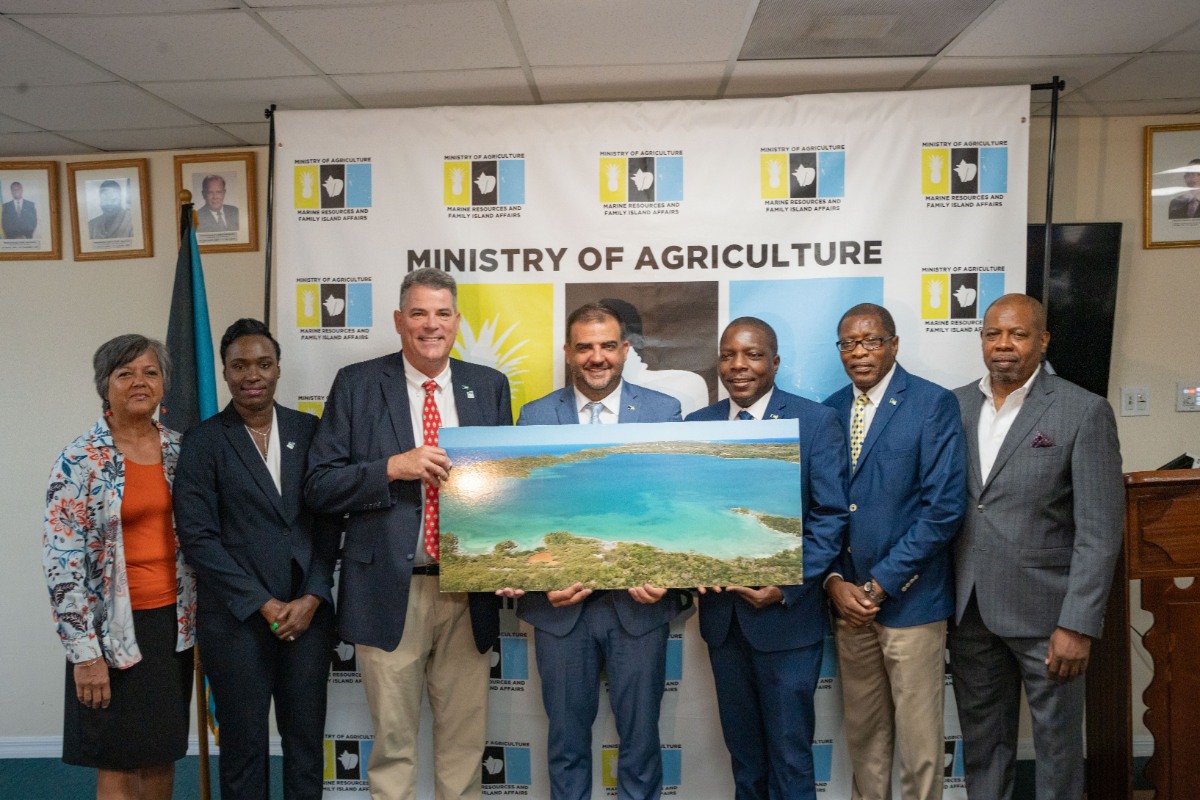
During the lease signing ceremony for Seahorse National Park, Minister Clay Sweeting, said, “This lease agreement for Sweetings Pond has been a long time coming. It represents a milestone in our journey towards sustainable development. It symbolises our collective responsibility to safeguard our natural heritage and create a harmonious relationship between economic progress and environmental preservation.
“I would like to express my gratitude to all stakeholders in this process of drafting and finalising this lease agreement. Their dedication, expertise, and commitment has been crucial in ensuring that this agreement falls in line with our vision of creating a thriving ecosystem while promoting responsible usage. Let us continue to preserve the jewel that is Sweetings Pond for many generations to come.”
The BNT invites the public to stay tuned for more news about its plan for the country’s newest national park: Seahorse National Park at Hatchet Bay Cave and Sweetings Pond!
To learn more about the role the BNT plays in managing terrestrial and marine national parks, conserving wildlife, and informing environmental policy, please visit its website: www.bnt.bs
Follow/subscribe to its various social media channels: Facebook, Instagram, Twitter, and YouTube.
Banner Image: A lined seahorse (Hippocampus erectus), female, clining to algae in an alkaline pond in The Bahamas by Shane Gross
News
PADI Club invites Ocean Lovers on exclusive dive trip to Bonaire this September
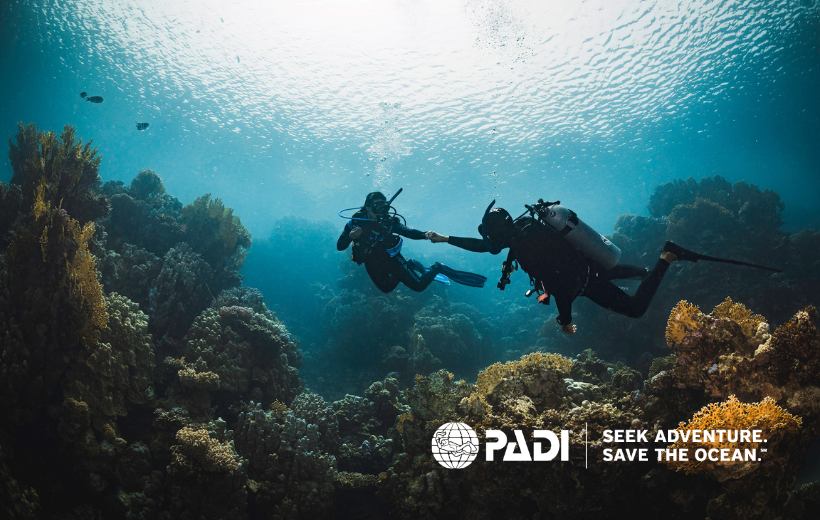
Following the popularity of the PADI Club trip to Belize at the end of July, a second “dive trip of a lifetime” has just been announced by PADI Club to Bonaire this September 23-30, 2023.
Offered exclusively for PADI Club members as part of their yearly benefits, attendees will get to seek adventure while staying at the all-inclusive Buddy Dive Resort, one of PADI’s premier members on the island. Other PADI Members in Bonaire – including Toucan Divers, Divi Flamingo, Wanna Dive, Dive Friends and Scuba Do – will also be hosting various dive experiences throughout the week.
“Bonaire is a unique and beautiful gem in the Dutch Caribbean and we want to show our Club Members this little island looms large as a dive destination,” says Zach Pavkov, PADI Club Operations Manager. “This trip offers participants a chance to not only explore a world-class diving destination but do so through some of the very best PADI Operators.”
PADI Club members will receive a generous discount for this seven-day diving adventure, with packages starting at $1,739 per diver for double occupancy.
Included in the package are:
- social events that include hosted dinners, cocktail parties and live music
- transportation in Buddy Dive Resort’s famous pick-up truck
- daily shore diving and boat diving
- accommodation, with the option to share a room with another solo diver or rent out one, two and three-bedroom apartments to host larger groups of divers
- surface interval activities that include PADI Seminars and island excursions like hiking and bird-watching.
“Because the water surrounding Bonaire has been an established marine park for 44 years, Bonaire is now a top-ranked destination with abundant marine life that includes scorpionfish, flounder and frogfish, moray eels, hawksbill turtles and eagle rays, ” continues Pavkov.
With limited spots available, the list of participants will be decided on a first-come, first-served basis. Those who are not yet PADI Club Members but are interested in joining the trip can sign-up, which will also give them access to:
- 20% of PADI eLearning® programs and PADI Gear™
- a free ReActivate® online refresher
- a free DAN® Prepared Diver course
- a subscription to Scuba Diving® magazine
- access to the PADI Club Celebrity Speaker Series webinars
- brand partner benefits from GoPro, Uber, Salt Life and more
To further support ocean lovers to create positive ocean change, five percent of the PADI Club membership fee will go towards supporting conservation efforts around the globe.
“PADI Club benefits are designed not just to empower divers to explore the ocean, but also enable them to play a pivotal role in saving the ocean too,” says Pavkov. “This year’s additional expedition to Bonaire gives our community the chance to come together and explore our shared blue planet in a truly meaningful and connected way.”
Click here to sign up for PADI Club and reserve your spot here to join the Bonaire dive trip.








